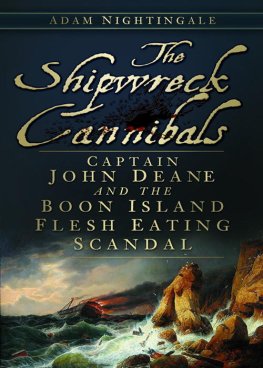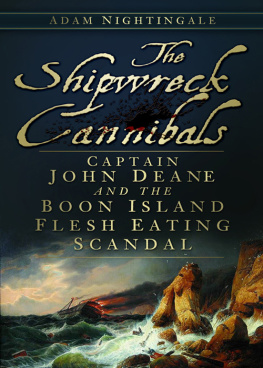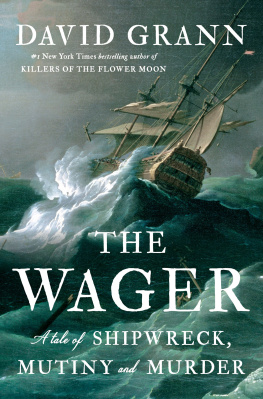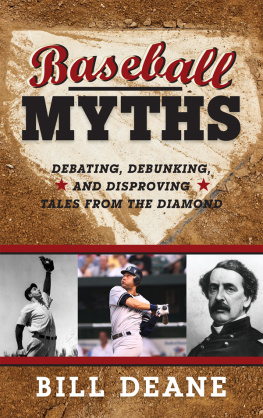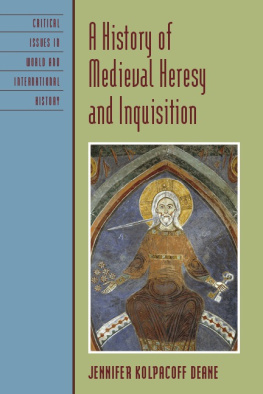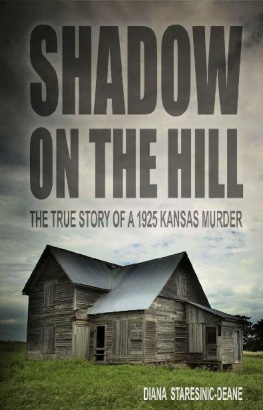Adam Nightingale
THE SHIPWRECK CANNIBALS
Captain John Dean and the Boon Island Flesh Eating Scandal
To Matthew Frost, Gods adventurer.
What shall we do unto thee, that the sea may be calm unto us?
The Book of Jonah

My thanks go to the following, whose assistance, tip-offs, encouragements and crash pads contributed to the writing of The Shipwreck Cannibals: Peter Nightingale; Susannah Nightingale; Alec and Jo Cobb; Gio Baffa; Nigel Brown (the Sheriff of D Block); Margaret Kight; Paul Baker; Carol King; the staff of the National Archives; Mark Beynon, Lindsey Smith, Lauren Newby and Cate Ludlow of The History Press; John Pycroft and the staff and pupils of Emmanuel Church of England School; Bromley House; Warren Weiss; and Richard Warner, whose original research provided the skeleton to which I added the succulent meat.
Of the ten survivors of the Nottingham Galley, Captain John Deane was one of the few that could still physically stand upright when a New England fishing boat retrieved him and his crew from the rock the locals had christened Boon Island. The fishing vessel, or shallop, had left the open sea and had entered the mouth of the Piscataqua River on the way to Portsmouth where food, lodging and medical attention awaited Deane and his crew.
There had been fourteen survivors when the ship had struck rock and marooned the crew on Boon Island. Four had died. Two had perished on the island and one was lost to the ocean. The body of the last of the dead had been discovered on the mainland. The rest had survived for twenty-four days blasted by the wind and soaked by the ocean, with no natural shelter and virtually nothing to eat. They had come close to starvation. They had come near to madness and had believed themselves eternally damned. They had all done something to survive that they were loath to talk about away from the confraternity of survivors. They had eaten human flesh.
John Deanes credit was good and he was keen to get to his lodgings ahead of the rest. He had arranged for a canoe to take him to Portsmouth faster than the shallop could presently manage. Deane transferred from the shallop to the canoe. He took his friend Charles Whitworth with him. Whitworth was lame in both feet and incapable of walking. He had to be carried into the canoe. The two men reached shore at eight oclock in the evening. Deane spotted his lodgings and leapt out of the canoe. He forgot himself for a moment. He had barely strength enough to walk but now he ran to his lodgings. He entered the house unannounced. He was skeletal. His hands were torn ragged and some of his fingernails were missing. The house belonged to Jethro Furber, a friend of Deanes who had led the party that had rescued him and his crew from Boon Island. As Deane entered the house unannounced he encountered Thurbers wife and children who fled from him in fright.
Deane seemed indifferent to the fact that he had driven his hosts from their own home. He walked around the house until he found the kitchen. He picked out the ingredients for a meal, some turnips and some beef. He placed them on the kitchen table, determined to cook something for Mr Whitworth and the men that had rowed him here. He began to prepare the meal. He reserved a small piece of turnip for himself and ate it raw.
Preparations for the meal were disrupted when a group of local men entered the kitchen. They laid hands on John Deane and dragged him from the kitchen table. Confusion reigned for a short while until Mrs Thurber returned to the house with more accurate information. John Deane was released, taken to his room and tended to. Mr Whitworth was lifted from the canoe and carried to the Thurber house.
The remaining survivors of the Nottingham Galley were brought to Portsmouth and taken care of by the towns populace. Most of them were incapable of walking. Most had suffered horribly from frostbite. Only John Deane retained possession of all of his fingers and toes. Many of the survivors would never regain full health. A few would die shortly afterward.
The men convalesced as best they could. The town seemed to take them to heart. It was evident that a great drama had played itself out some seven leagues from where they lived. The survivors were rendered heroes in the eyes of the populace. But it couldnt last. At some point the protest, the official account a captain must give when he has lost his vessel, had to be written. The shared secret needed to be addressed. They had all eaten human flesh. They had done it to survive. They had eaten a man already dead. No innocent blood had been shed. But any potential scandal Deane must have anticipated was all of a sudden subsumed in a new controversy.
Deane wrote his protest. Christopher Langman, the first mate, countersigned it. But as soon as he was well enough to leave his lodgings Langman turned on his captain. Along with the boatswain Nicholas Mellin and George White, a member of the crew, Langman appeared before a local magistrate and all three signed affidavits denouncing John Deane. They accused Deane, his brother Jasper and Charles Whitworth of fraud. They claimed that Jasper Deane and Charles Whitworth had overinsured the ships cargo and that John Deane, on at least two separate occasions, had tried to lose the ship so that Jasper Deane and Charles Whitworth might claim on the insurance. The second attempt to lose the ship had resulted in the wreck of the Nottingham Galley and the subsequent loss of four lives. Langman, Mellin and White also accused John Deane of having perpetrated a violent assault on the first mate in the hours immediately preceding the shipwreck.
Little seemed to have been done to address the accusations in New England so Deane and company, and Langman and company, returned to the British Isles and resumed the controversy there. In London, John Deane got wind of the fact that Langman intended to publish a detailed account of the Boon Island adventure. Jasper Deane quickly rushed into print Deanes version of events, narrowly beating Langman to the punch. A pamphlet war erupted. And although accusations of fraud and brutality were the principle charges for each side to either prosecute or refute; tales of cannibalism were the salacious anecdotes lapped up by the reading public that turned the affair into a cause celebre. And although both parties agreed on the necessity of eating human flesh in their warring versions of events, each put their own spin on theirs and their enemies attitudes towards cannibalism.
Everyone involved would be tainted by the events of Boon Island. But because John Deane lived the longest and achieved the most, the weight of the broken taboo hung heaviest upon him. And despite a career that would bring him into the orbit of Peter the Great and Robert Walpole, heaping glory and further shame upon him, the spectre of Boon Island would always cling to him, like Sinbads Old Man of the Sea, wrapped around his throat and waist, choking him, virtually impossible to dislodge no matter how hard he tried.
Part One
Survivor

John Deane was born in either 1678 or 1679. His older brother was named Jasper after their father. He had a sister named Martha. The family was moderately wealthy. Other than that, virtually nothing is known of Deanes youth and early adulthood. His childhood home was the village of Wilford. The parish of Wilford was situated on the southern borders of Nottingham. Nottingham Castle was visible across the River Trent and the fields that separated Nottingham from Wilford Village. The dark, compact Anglican beauty of St Wilfrids church dominated the river bank on John Deanes side of the Trent. Access to Nottingham was granted by ferry. In landlocked Nottinghamshire the ferry would have been John Deanes principal contact with the element of water in his early years.

